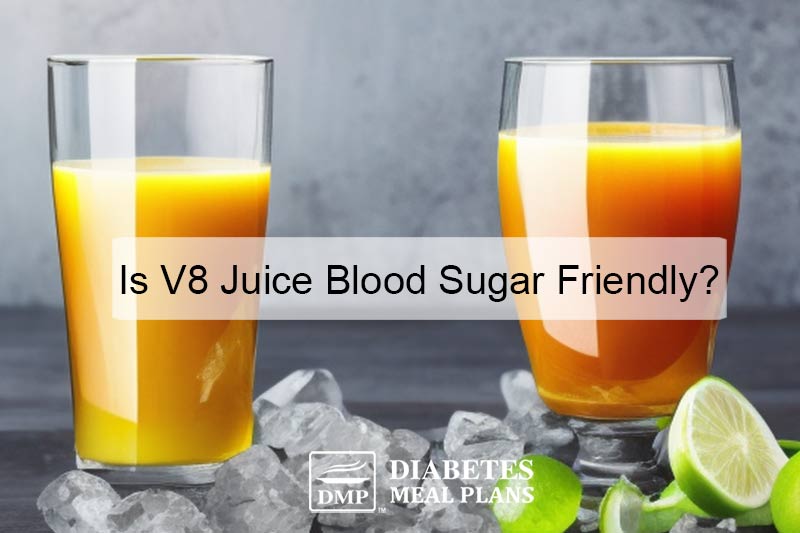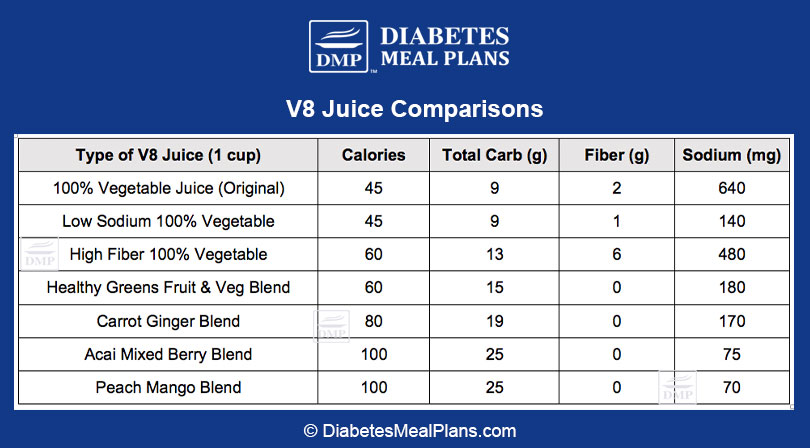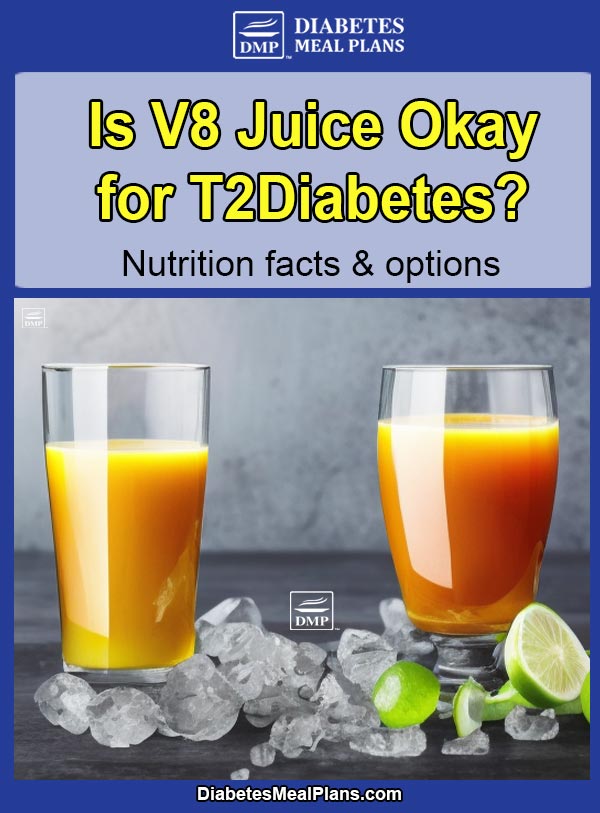Table of Contents[Hide][Show]
“I could’ve had a V8!”
Does that old slogan ring any bells?
You may have seen their commercials on TV or even enjoyed a can of V8 yourself.
V8 juice has been a health food favorite for decades, but is V8 juice a good option for people with type 2 diabetes and prediabetes?
Let’s investigate…

What is V8 Juice?
V8 is one of the many brands owned by Campbell’s, a company famous for its cans of tomato soup. Naturally, their line of tomato-based vegetable juices makes sense.
V8 offers a variety of juice, starting with their Original 100% Vegetable Juice.
Just as it sounds, this one is all vegetables (tomato, carrot, celery, beets, parsley, lettuce, watercress, and spinach) along with natural flavors, salt, and a few added antioxidants.
But it doesn’t end there; the V8 juice lineup has greatly expanded since its creation in 1933. They now offer several fruit and vegetable juice blends, ranging from their original recipe to carrot juice to a mixed berry cocktail.
With so many options to choose from, how do you determine which (if any) are OK for people with type 2 diabetes?
It all comes down to the nutrition facts.
V8 Juice Nutrition Facts
Let’s compare a few popular V8 juices to see how just how much fiber, carbs, and sodium (salt) we can expect from each type.

As you look down the chart you may notice a few patterns.
The first three options (all pure vegetable juices) contain fewer carbs, more fiber, and more sodium when compared to the others.
The four other blends (which contain fruit juice) have way more carbs, no fiber at all, and less sodium.
This makes sense because fruit contains far more sugar/carbs than most vegetables do. It’s amazing to see how quickly those carbs add up when you add just a little bit of fruit juice concentrate to the blend.
So, what’s with the sodium?
Fruits and vegetables naturally contain small amounts of sodium, but V8 adds sodium to their vegetable drinks as a preservative and flavor enhancer. In the fruit-based juices, the natural sugars do all the talking, but the 100% vegetable juices would taste bland without a little something extra.
If you have a specific health concern with salt, then reach for the low sodium V8 option, otherwise, the standard option is fine.
Doctors suggest staying under 2,300mg of sodium per day, so as long as you keep your processed food intake under control you shouldn’t have to worry about going into sodium overload by drinking a V8.

Is Vegetable Juice Healthy?
Vegetable juice can be a little controversial in the health world.
Some people claim it cures everything from high blood pressure to cancer, while others find it to be wasteful and pointless.
We fall somewhere in the middle of these two extremes.
Truthfully, vegetable juice is a bit of a step down from actual, whole vegetables. Juicing strips the fiber from the produce, leaving you with a cup of water plus some vitamins, minerals, and antioxidants.
Also, juice just isn’t filling and it definitely doesn’t make a good meal replacement because it’s so low in calories. So don’t go skipping out on a real dinner thinking that a V8 juice is healthier. You need fiber, protein, and fat in order to feel your best and stabilize blood sugar…and juice contains none of these.
That doesn’t mean you can’t have a glass of pure vegetable juice if you enjoy it. Getting an extra antioxidant boost in the form of juice can be a great thing, but in terms of feeling satisfied and energized, it’s always better to eat your vegetables than drink them if you have the choice.
Extra tip: buyers beware, as sellers of “Green juice” can be pretty sneaky, marketing their product as if it’s mostly vegetables when it’s actually chock full of fruit juice (and therefore, sugar)!
Did you notice the number of carbs (sugar) in the “Healthy Greens” V8 juice blend? What a misleading title. Always look at the back of the nutrition label to check for “total carbs,” and then scan the ingredients list for any fruit or fruit juice concentrate.
Sadly, most store-bought juices will contain a lot of sugar.
Speaking of which…
Fruit Juice & Blood Sugar
The V8 fruit blends may not contain any “added sugar” but the natural sugar from the fruit juice concentrates can cause enough trouble on its own.
The reality is that your body can barely tell the difference between added and natural sugar!
Fruit juice of any kind is loaded with natural sugar (fructose) which your body reacts to the way it might react to soda pop or other soft drinks.
For example, the V8 Peach Mango juice contains 25g of sugar per cup. Whether that 25g of sugar comes from apple juice, carrot juice, or a can of Cola, your blood sugar levels and insulin will react accordingly.
Yes, fruit juices are technically healthier than soda, since they do supply some micronutrients, but we definitely don’t recommend either option. If you’re going to have juice, make it vegetable juice.
V8 Juice: Yes or No?
The fruit juice blends are an easy “pass!” as they are a bit higher in carbs, but the V8 100% vegetable juices are suitable options to choose.
If you love V8, go ahead and enjoy some V8 100% Vegetable Juice on occasion, just be sure to fill up on solid, whole foods for most of your meals; and monitor your V8 portion sizes to maintain good blood sugar levels.
**Download our food list below to learn more about the best foods to eat!

The non-fruit V8 is also a terrific source of potassium which, as a type 2 person, is difficult to get enough of as pertains to the daily dose of that particular element. I suspect that most of us in this category may struggle with that so it’s worth mentioning. It is also worth mentioning that it has 7grams of sugar per serving which is a bit risky for some of us.
The non-fruit V8 are the only ones recommended if a person wishes to try them, and the carb counts are listed in the table above. Total carbs contain the sugars and that’s more important.
Good afternoon – My blood sugar is borderline prediabetes. I love my original v8 juice not the fruit juice variety. Can I drink it in moderation. I never drink soda of any kind and really look forward to it along with plenty of water and green tea and coffee no sweeteners used at all. Thank you.
Hi Ann, Yes, drinking V8 in moderation is fine, as described in the article – enjoy!